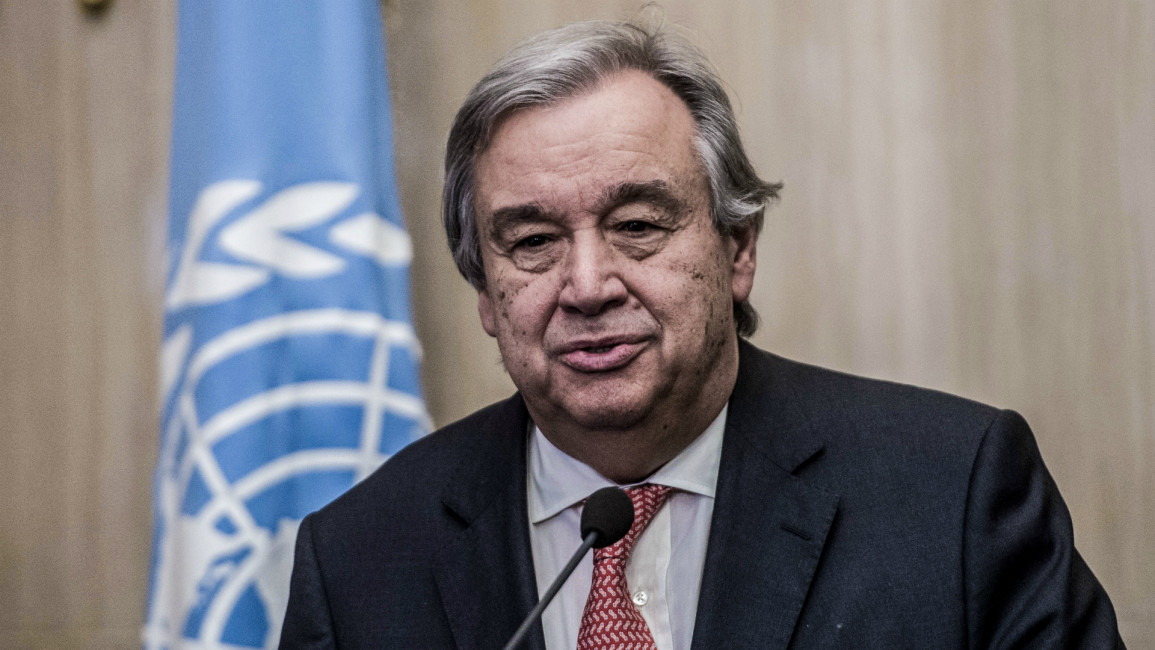Syria should be referred to the ICC for ‘serious violations,’ says UN chief
The UN secretary-general called on the UN Security Council to refer to Syria to the International Criminal Court, citing "serious violations" including blocking aid deliveries and medical care to millions in need.
Antonio Guterres called all countries and civil society parties to cooperate with an independent panel established in December 2016 by the General Assembly, in order to aid the investigation and prosecution of those responsible for war crimes or crimes against humanity in Syria.
Guterres added that "accountability for serious violations is a requirement under international law and central to achieving sustainable peace" in a report on the humanitarian situation in Syria to the council circulated on Friday.
No aid was delivered to over 417,000 people in nine "besieged" locations during December, he added, and only 60,000 of the nearly 2.5 million Syrians living in "hard-to-reach" areas received humanitarian help.
"Access for the United Nations and its partners to those people living in besieged and hard-to-reach locations remained a critical concern," Guterres said.
In many areas, "as a result of active conflict, shifting conflict lines, administrative impediments and deliberate restrictions imposed on the movement of people and goods by the parties to the conflict," deliveries of food and aid remained extremely challenging.
The secretary-general singled out the deteriorating humanitarian situation for the estimated 393,000 people living in eastern Ghouta, an opposition-held pocket besieged by Syrian forces. Prices for basic goods there are some 30 times higher than in neighboring Damascus city, "far beyond the purchasing power of most residents," he said.
The UN chief called on all countries with influence over the Syrian government and opposition fighters "to do their utmost" to facilitate medical evacuations and humanitarian aid into eastern Ghouta.
While Guterres again urged that Syria be referred to the International Criminal Court, the search for justice has proven to be exceedingly difficult, especially at the United Nations.
A Security Council resolution backed by more than 60 countries to refer the Syrian conflict to the ICC was vetoed by both Russia and China in May 2014.
A new attempt at the council to refer Syria to the ICC would almost certainly face a similar fate.
But following the double veto, several countries, including Sweden, Germany, France and Finland, said they were investigating or prosecuting alleged perpetrators of grave crimes in Syria.
On Tuesday, US Secretary of State Rex Tillerson accused Russia of being responsible for chemical weapons attacks in Syria — a charge that draw a furious response from Moscow.
Tillerson said at a conference on Tuesday in Paris that Moscow "ultimately bears responsibility for the victims" of chemical weapons attacks in Syria since it became militarily involved in 2015. He accused Russia of violating its own commitments under a 2013 US-Russia agreement to rid Syria of its chemical weapons stockpiles and an international treaty that bars their use.
The US secretary of state's remarks followed the targeting of a Damascus suburb by chemicals for a second time in two weeks. The heavily populated civilian town of Douma was hit in a suspected chlorine gas attack leaving over 21 casualties suffering from burns and breathing difficulties, including children.
The Damascus suburb of around 400,000 people has been besieged by regime forces since 2013, in an attempt to strangle the rebel region into submission. Chronic food, fuel and medicine shortages have been reported.
Eastern Ghouta was targeted with nerve gas in the same year, killing hundreds of civilians.
The Organisation for the Prohibition of Chemical Weapons (OPCW) and the UN blamed the Syrian regime for a more deadly sarin gas attack on the opposition-held village of Khan Sheikhoun, Idlib in April 2017.
As many as a hundred civilians were killed and it triggered an unprecedented US missile strike on the airbase believed to be the source of the nerve gas attack which has been widely attributed to Assad's regime.
The regime was also accused of using chlorine gas in at least three different areas of northern Syria in 2014 and 2015.
The UN has called for those responsible for the attacks to be brought to justice.
Around 500,000 people have died and millions made homeless in seven years of fighting in Syria, which was sparked when regime forces brutally put down peaceful protests in 2011.



